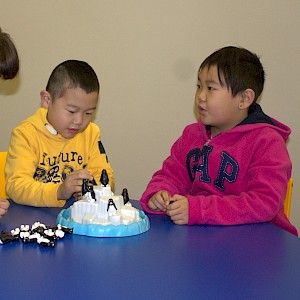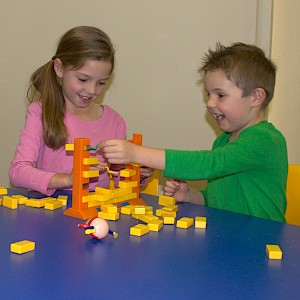Talking with your children is important for language and learning, but also to support social and emotional development as well. This growth can be developed through parent/teacher/peer modelling and through building friendships.
The following blog offers a list of ideas to help children develop these skills:
1. Encourage and help your child talk about their feelings!
We use many different words to describe how we’re feeling. Helping express this to others can help children and adults to better recognise, manage and regulate these emotions. Let your child know that it is okay to be sad or angry, as this can happen to everyone at times. So how can I do this? Link it to their experiences! Watch your child's behaviour and give them a word for the way they are feeling. "I can see you feel angry that your sister snatched you toy." Talk about your own feelings openly too when appropriate so they can see that talking helps people manage their feelings. This can also include positive emotions! For example, “It makes me feel happy when you play nicely with your sister.”

2. Support your child with opportunities to play with others (family, friends, and school/kindy peers). Friendships help children learn how to be good friends and how to relate with others. Therefore, it is important that they are offered opportunities and time to develop these relationships in both structured and unstructured activities. Unstructured “free play” opportunities with neighbours, family, friends and peers can help support social and play skills spontaneously and can help children to negotiate and problem solve. This could include play dates at each other’s homes, going to the park. Structured activities like sports and clubs can further support this and help children what is socially appropriated in different contexts. For example, at soccer we have to listen to the coach and work with a team to share the ball, whereas at the park we can play on any of the equipment with everyone.
3. Model appropriate social behaviours for your child.
Don’t hide your emotions and feelings from your child! Children are great observational learners and benefit from watching adults model skills that they are learning or that are new. Therefore, allow your child to see you managing your feelings and social situations well. To help your child develop this regulation ability and understand your reasoning for social interactions, think out loud about how you are managing your feelings.
Example 1: “I am angry that I dropped this glass, but I will take deep breathes and ask for help to clean it up safely and calmly.”
Example 2: "I really like seeing my friend on the weekends, but she is too busy to catch up this weekend. I was sad, but we will see each other another time.”

4. Allow your child opportunities to make age-appropriate choices. Offering children choices and to make decisions gives them a sense of control. This could be choosing (out of limited options) what they want for dinner, where they want to go today, or what toy they want to play with at home. This has also shown to increase their likelihood of accepting and behaving in an appropriate way when a choice or input cannot or isn’t offered (going to the doctor). Choices also help children to learn about consequences of decisions, such as choosing to go to the beach on a cold day may mean no swimming.
5. Develop your child's confidence.
Confidence helps support children’s motivation and willingness to try new things and problem solve. Confidence can be supported through encouraging them to try new things and praising them for doing so regardless of the outcome. Talk with your child about their effort and strengths rather than their outcome that is; learning, trying hard, having a go and not giving up. It is important to give honest feedback and discuss that everyone makes mistakes at times.

6. Develop your child's problem solving skills.
It is easy to want to help your child if you see they are stuck in a situation. Instead, use this to support their problem solving skills so that they can learn how to fix the problem. Ask questions, discuss and describe the problem and help them think of solutions. Talk through together the likely outcome of each solution and help them choose the best option. If they are still stuck, teach them how to ask someone else for help.
7. Allow your child to use and practice social skills and language in everyday situations. Teach your child how to answer the phone, ask for directions in the shopping centre, order a drink at the cafe and then let them have a try at doing it. If the child is old enough, ask the child how they think they went. Let them know what they did well and what to try differently next time and encourage them for having a go.
8. Provide your child with opportunities to talk about their friends with you.
Confidence to talk to parents about anything, including friendships is important. Ensure to listen actively and show genuine interest to make sure they feel heard and comfortable to come to you with any concerns they may have. Try to be open minded and non-judgmental about minor things and help your child problem solve themselves, that way they are more likely to trust you if a major issue that needs adult intervention occurs.

If your child has needs extra help making friends or playing with others some things that you can try include:
- Offering a range of age appropriate toys and activities.
If your child has very specific and limited interests try offering some things that are similar to what your child enjoys but perhaps are also things that other children may enjoy. For example if your child is fascinated with garbage trucks try introducing garbage trucks and also diggers and dump trucks into the sand pit. Later introduce a child who enjoys this type of play to play alongside or with your child. - Encouraging your child to imitate actions with objects.
Expand your child’s actions by copying them then adding an extra action to the sequence and see if they will copy you. Then involve another child such as a sibling, copy the other child and encourage your child to do the same. - Talking about your child’s play by acting as a narrator.
This strategy is great for supporting all areas of language (understanding, grammar, vocabularly, sequencing etc) as well supporting social skills and feelings. “Look dolly is eating her birthday cake, she looks happy, now she is getting full”. Include another child and talk about what they are doing also to help draw your child's attention to the other child's actions. - Providing opportunities to play with children of a similar developmental level, who also have some shared interests. This can also help scaffold later friendships. You may need to play with them initially to support and cue your child.
- Developing your child's ability to take turns. Taking turns and sharing is a key play and social skill to support friendships and help manage feelings. Initially play games with short simple turns, such as rolling a ball or car back and forth or taking turns to put a piece in a puzzle or shape sorter. Introduce another child into these simple activities initially, "let's do the puzzle, together with Jack". Gradually move to more open ended and less structured activities. You may need to use visual cues, hand over hand support, verbal cues and gestures to cue your child's turns to start with. Gradually remove these cues and wait for your child to respond.
Remember to set your child up for success in playing with others. This may mean:
- Carefully selecting play partners initially. Same age peers with similar interests can be good, however some children may respond better to slightly older children (who are more patient and understanding) or slightly younger children (who are closer to their developmental level) if their social skills are only just developing.
- Discussing with the other child's parent that your child finds playing with others tricky and that they may need some extra help and support. You may do this with the other child too if it is appropriate for their age and maturity level.
- Keeping play sessions short initially, watching for signs when your child has had enough and offering a solitary activity for each child to give your child a break when they need it.
- Supervising closely while children are playing together to manage any problem behaviours.
- Removing any very special toys that your child has that they may not like other children to touch, prior to the play session to avoid conflicts.
Does your child need extra help with social skills? The team at Talking Matters offers the “What’s the Buzz?” program to school aged children, to help develop social skills. We also have a play skills program for preschool aged children. If you think this program would benefit your child find out more by contacting our office. Links to contact us are available on the Talking Matters website
Related Blog Posts
If you liked this post you may also like:
Top 10 toddler toys
45 School Language Strategies
Picture exchange
5 sunny day ideas



